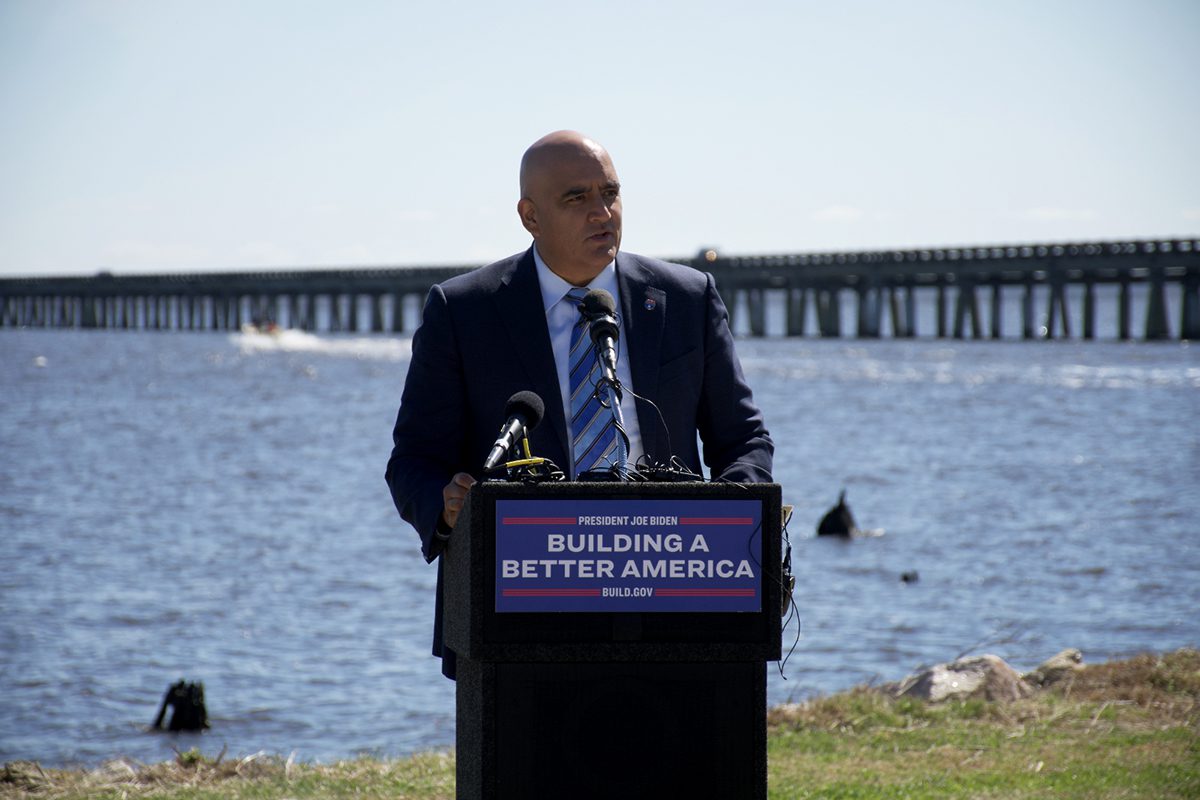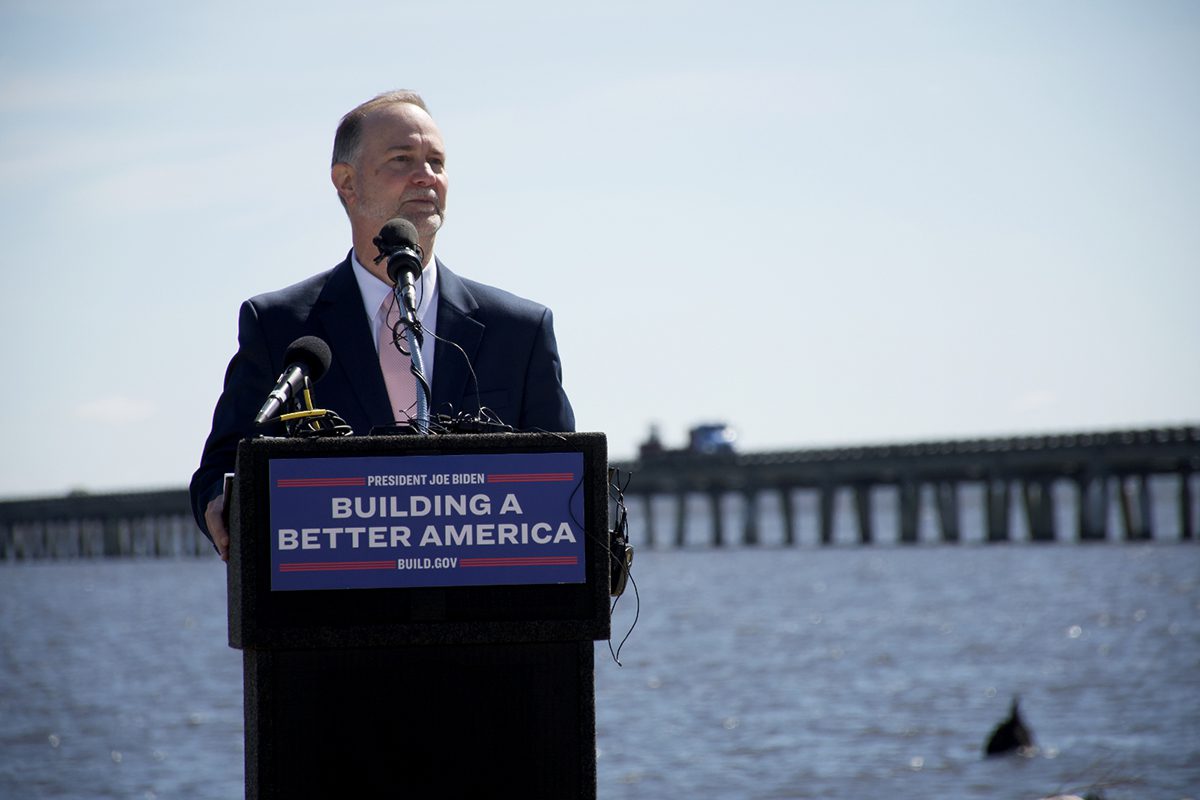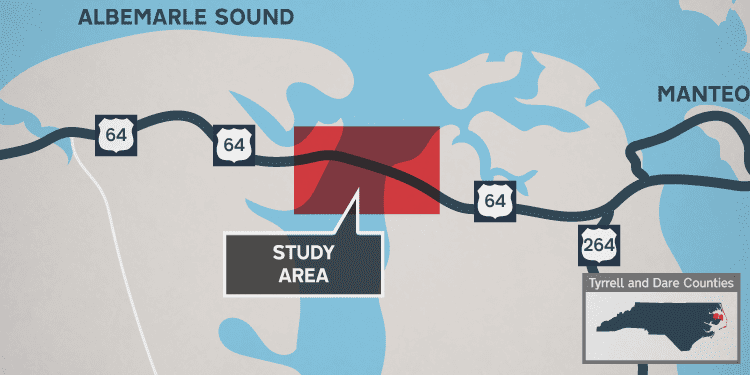
COLUMBIA – The long-planned replacement of the 60-year-old, two-lane, swing-span bridge that is the only direct link between Raleigh and the Outer Banks will come years sooner thanks to a recently announced $110 million federal infrastructure grant.
Gov. Roy Cooper, Federal Highway Administrator Shailen Bhatt and North Carolina Department of Transportation Secretary Eric Boyette joined Tyrell and Dare County officials Thursday at the west side of the Alligator River bridge on U.S. Highway 64 in Columbia to celebrate the grant from the U.S. Department of Transportation Mega Program.
Supporter Spotlight
The competitive grant program, also known as the National Infrastructure Project Assistance program, provides money for “large, complex projects that are difficult to fund by other means and likely to generate national or regional economic, mobility, or safety benefits,” according to the program website. The North Carolina award also includes broadband funding.
The estimated $294 million project to replace the Lindsay C. Warren Bridge, which opened to traffic in February 1962, includes a new structure just north of the existing one and connect Tyrell County segment of U.S. 64 to Old Ferry Road in Dare County. Construction is now expected to begin as soon as winter 2024.
“It’s my understanding that this bridge has been accelerated by at least a decade,” Bhatt said during the press gathering, adding that, “Because while everybody’s trying to do their best, there wasn’t a lot of money sitting around.”
Bhatt said the project is one of the first Mega grants that USDOT had awarded and one of only nine awarded nationwide. Officials announced the award in January.
Boyette, when asked after his public remarks whether the project was now fully funded, said the state’s existing commitment was a significant reason why North Carolina was awarded the grant.
Supporter Spotlight

“We can show the gap in our funding. This is what we’ll need to complete it. That was one of the pluses for us,” he said.
The bridge is one of two highway corridors to the Outer Banks — the other being the Wright Memorial Bridge on U.S. 158 — but its importance is greater than a way for tourists to get to the shore. Tyrell County is one of the state’s most economically distressed, and a significant number of its 3,200 residents have jobs on the Outer Banks, a point Tyrell County Manager David Clegg underscored.
“It creates today easily 500 jobs between the two counties,” Clegg said.
The bridge’s swinging center span that opens 90 degrees for boat traffic sometimes fails to close and is one of the most apparent problems with the bridge. However, a 2021 NCDOT evaluation classified the bridge as structurally deficient with a sufficiency rating of 31.71 out of a possible 100.
“The existing bridge requires costly, heavy maintenance on a regular basis,” according to the report.
“It’s very clear the 60-year-old swing-span behind me is not supporting the community,” said Transportation Secretary Boyette during his remarks.

The replacement project, listed as HB-0001 by NCDOT, includes numerous improvements over the existing bridge. Perhaps most importantly, the fixed center span will provide a 65-foot clearance for boat traffic. The new two-lane bridge will include 8-foot-wide shoulders, enough for a bike lane. The existing bridge has 1-foot-wide shoulders.
Along with the planned improvements to the transportation corridor between Raleigh and the Outer Banks, Cooper highlighted another infrastructure improvement that is also funded in the federal grant.
“Part of what’s going to happen with this bridge is going to be high-speed internet all the way from Rocky Mount to Nags Head,” Cooper said.
Boyette also noted that the grant was a way to remember longtime Division 1 Engineer Sterling Baker, who died of cancer in April 2022.
“We named this grant application after Sterling, the STERLING grant — Strengthening Transportation Evacuation Resilience Lifeline and Improving our Network’s Gateway,” Boyette said.







